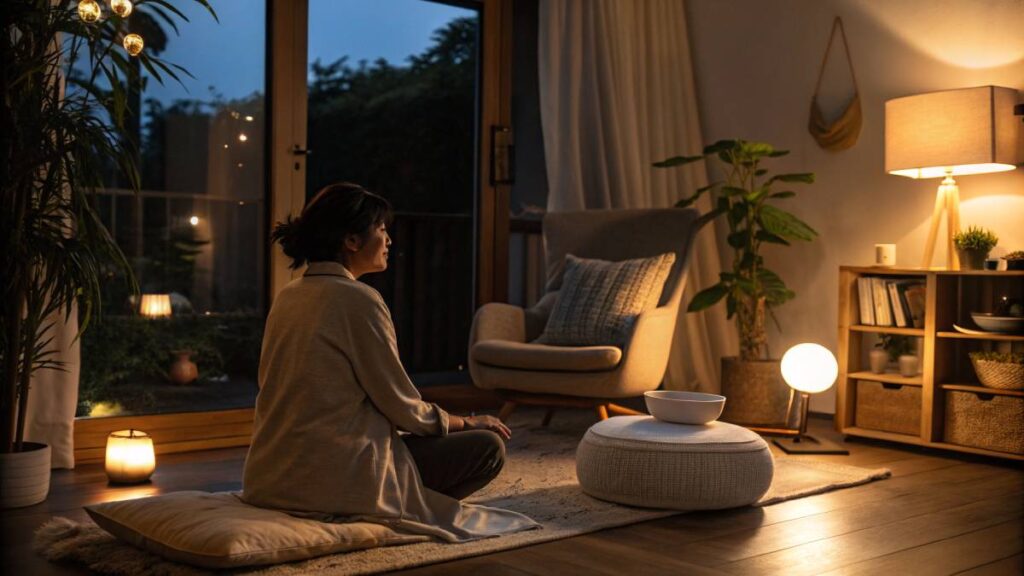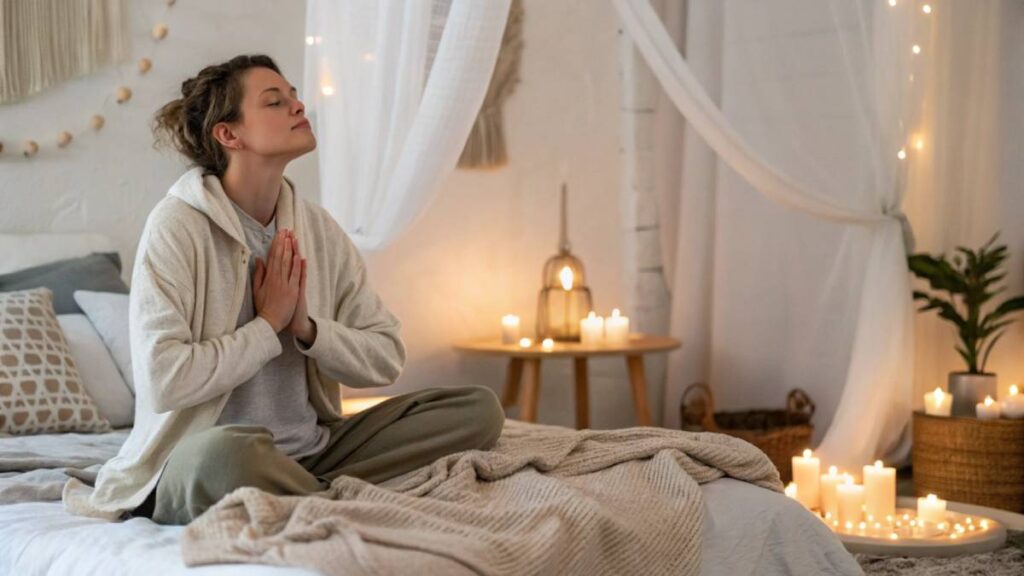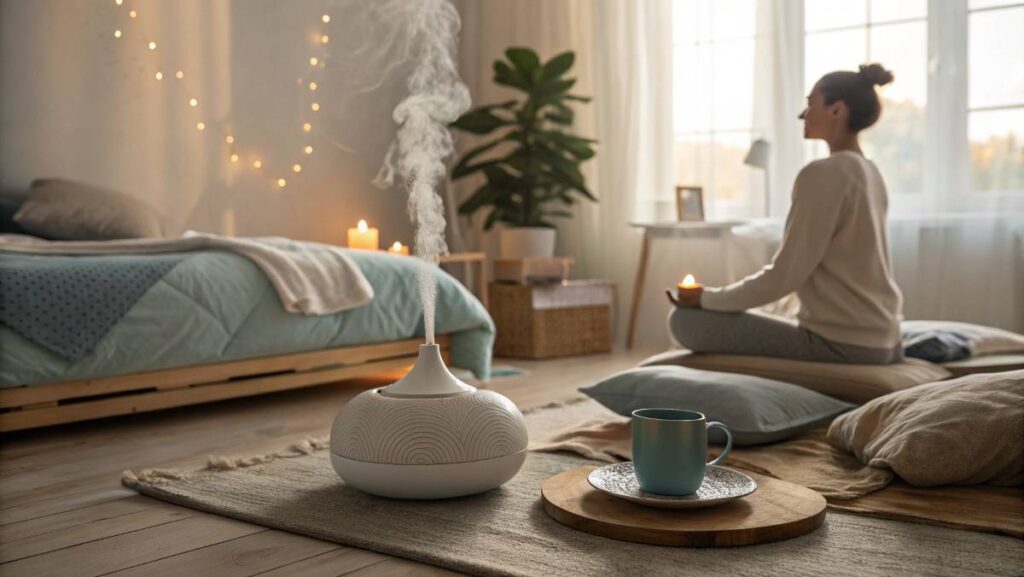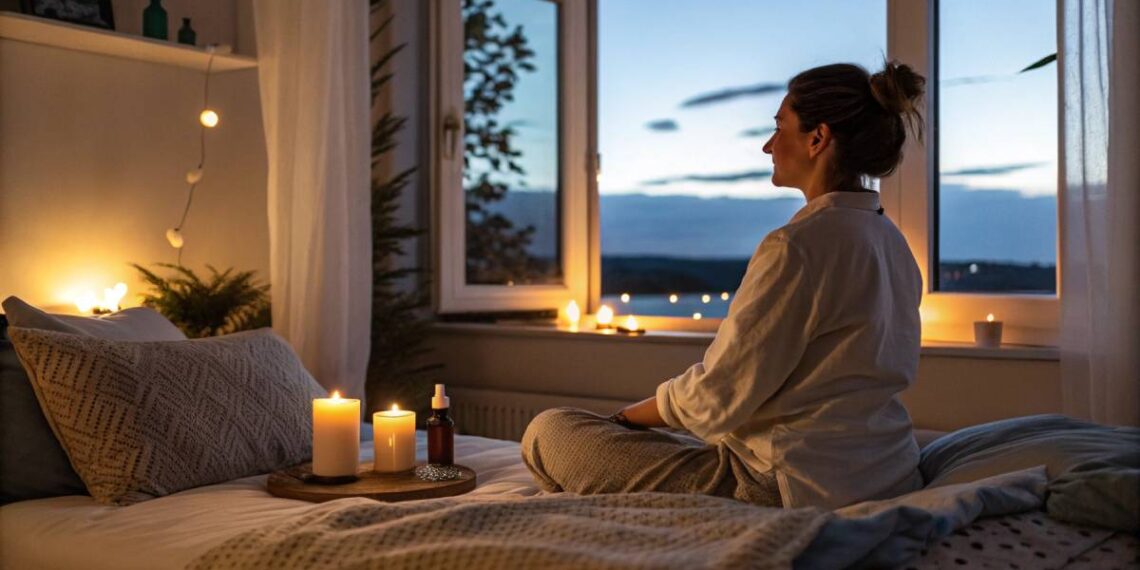Ever lie awake staring at the ceiling, your mind racing while sleep seems miles away? You’re not alone. Sleep anxiety affects countless individuals, turning bedtime into a battleground of restless thoughts and endless tossing. But there’s hope—meditation offers a natural, effective solution to calm your mind and pave the way for peaceful slumber. In this guide, we’ll explore how meditation can transform your nighttime routine, alleviate anxiety, and restore the restful sleep you deserve. Let’s embark on a journey to reclaim your nights and enhance your overall well-being through the power of meditation.
Main Key Takeaways
- Impact of Poor Sleep: Understand how inadequate sleep affects your daily life and long-term health.
- Meditation Techniques: Learn various meditation methods that promote relaxation and improve sleep quality.
- Implementing Meditation: Discover practical steps to incorporate meditation into your nightly routine.
- Combining Practices: Explore how pairing meditation with other sleep strategies can enhance effectiveness.
- Overcoming Challenges: Gain insights into managing restless thoughts and achieving consistent meditation results.
Sleep Troubles and Meditation
Can’t catch enough Z’s? If sleep issues have you feeling like a zombie, meditation might just be the soothing lullaby your nights need.
The Impact of Poor Sleep
Bad sleep? It’s not just about a few yawns during the day. It can mess with your head and even your health. Check out these common ugly friends of sleep struggles: daytime grogginess, mood swings, and brain fog. Keep ignoring these, and you might be looking at bigger baddies like heart troubles, diabetes, or packing on extra pounds.
| Symptom | Description |
|---|---|
| Daytime Fatigue | Feels like you’re dragging a 50-pound weight everywhere |
| Mood Disturbances | Crankiness through the roof, a tad anxious, down in the dumps |
| Cognitive Impairment | Hard time staying focused, memory’s like Swiss cheese |
| Health Risks | Opens the door to serious stuff like heart issues, diabetes, weight gain |
Crummy sleep doesn’t just hit you health-wise; it can turn work into a snoozefest and put your relationships on the rocks. Not the best combo, right?

Introduction to Meditation for Sleep
Ever tried meditation? It’s like a reset button for your sleep. A natural way to shush those racing thoughts and sink into sleep. Compared to popping pills with side effects from here to yonder, meditation is all-natural, like a grandma’s home remedy—but one that works.
Different kinds of meditation bring different goodies to the sleep table. Mindfulness meditation, body scan meditation, and loving-kindness meditation are just a few ways to slow the mental hamster wheel and chill out. When your mind eases up, sleep comes knocking.
Struggling to sleep or want to swap out your sheep-counting nights? Try sliding a meditation sesh in before bed. Shut down instead of relying solely on pills. Check out our takes on other natural ways to snooze at natural sleep solutions and best natural sleep aids.
Open the door to relaxation and realize meditation might just be your ticket to dreamland. Sleep better, live better—it’s all right within reach.
The Science Behind Meditation
Getting to know what’s happening with meditation might open your eyes to how it can help you catch those elusive Z’s and tackle insomnia.
How Meditation Affects Sleep
Meditating does its magic by putting stress on pause and letting your body chill out, very important for snoozing soundly. When someone meditates, the parasympathetic nervous system gets a nudge, calming the heart and setting up a cozy state of mind for some shut-eye.
Techniques like mindfulness and belly breathing can literally mess with your brainwaves. Studies have pointed out that these habits ramp up alpha and theta waves, kinda like the ones that stroll by during light and dream-filled sleep. That can make moving from day to dreamland much smoother.
| Meditation Technique | Brainwave Impact | Sleep Stage |
|---|---|---|
| Mindfulness | Boosts Alpha Waves | Light Sleep (Stages 1-2) |
| Deep Breathing | Boosts Theta Waves | Dream Sleep (REM) |
| Muscle Relaxation | Cuts Down Beta Waves | Deep Sleep (Stage 3) |
If you’re curious how chilling your body helps with sleep, check out our piece on natural ways to fall asleep.
Benefits of Meditation for Insomnia
Got the can’t-sleep blues? Meditation throws a lifeline. It can make drifting off faster and sleeping longer a reality. Plus, it cuts down on tossing and turning and jazzes up your overall sleep score.
- Fall Asleep Faster: Meditation might give you a quicker ticket to dreamland.
- Better Sleep Quality: More snooze time versus staring at the ceiling.
- Fewer Night Disruptions: Less time spent awake in the middle of the night.
- More Deep Sleep: Promotes those deep, refreshing sleep cycles.
| Benefits | Average Boost |
|---|---|
| Faster Sleep Onset | 20-30% quicker |
| Increased Sleep Efficiency | 15-25% better snooze |
| Fewer Night Interruptions | 30-40% less disturbance |
| Longer Deep Sleep | 20-30% longer |
Digging into various meditation styles, like mindfulness, can really help those with insomnia. Pairing a chill pre-bed routine with some meditation can level-up your sleep game. For more sleepy time tricks, peek at our guides on natural sleep aids and adult bedtime routines.
The secret to using meditation as a sleep aid is sticking with it, night after night. Eventually, this commitment pays off, smoothing out sleep bumps and getting you those sweet dreams you’ve been wishing for.

Types of Meditation for Better Sleep
Meditation can be your ticket to sleeping like a baby, without the crying and diaper changes. Let’s talk about three types that can help calm your racing mind: mindfulness meditation, body scan meditation, and loving-kindness meditation.
Mindfulness Meditation
Mindfulness meditation is all about being in the now and watching your thoughts without losing your cool. It’s like being the chill referee in a soccer game, just observing without getting involved. Turns out, it’s a great remedy for sleep troubles brought on by life’s little roller coasters.
Here’s how to give it a whirl:
- Plop down comfortably or lie back somewhere you won’t get spotted by the neighbor’s dog.
- Close those peepers and hone in on your breathing.
- If pesky thoughts barge in, just notice them, then kindly shove them back out of your mental space to focus on your breath again.
Doing this can hush the mental chatterbox and prep you for dreamland. It comes in handy for those stressing over not catching enough Z’s.
Body Scan Meditation
Body scan meditation has you playing a game of “Where’s Wally?” but it’s less about stripes and more about feeling all the feels, from your toes on up. It’s perfect if insomnia’s been turning you into a night owl.
Here’s the lowdown:
- Cozy up lying flat like you might melt right into the couch or bed.
- Shut your eyes and start noticing your breathing—it’s just you, the air, and your cozy blanket, if you have one.
- Kick off at your toes, relaxing each part as you work on up to your noggin.
This way, you loosen up all that muscle tension and before you know it, you’re snoozing peacefully.
Loving-Kindness Meditation
Loving-kindness meditation, or Metta meditation if you’re feeling fancy, kicks negativity to the curb by sprinkling your mind with kindness like you’re adding candy to your ice cream. This means showing love to yourself and others—and it’s good for the soul and, you guessed it, for sleep.
Here’s how you roll with it:
- Get cozy sitting down, like you’re about to binge your favorite TV series.
- Close your eyes, take some big deep breaths.
- Whisper positive vibes like “May I be happy, may I be healthy, may I be at peace” to yourself.
- As you feel the peace vibes building, spread those wishes, starting close with loved ones and then sprinkle them towards anyone and everyone you know.
This practice pours a soothing balm over tangled emotions, setting the stage for that unbeatable night’s rest. If you’re looking for more ways to nod off naturally, peep our guide on best natural sleep aids.
Adding these meditation moves to your nightly wind-down might just make you toss your sleep meds out the window. For more on turning your bedroom into a sleep oasis, check out our tip sheet on a sleep-friendly bedroom.
Getting Started with Meditation
Meditation can be your secret weapon for catching better z’s. When you’re about to embark on this relaxing journey, you gotta make your spot cozy and lock in a regular routine.
Creating Your Zen Den
Having the right space can make a world of difference when you meditate. A good spot can set the tone to unwind and float off to dreamland.
- A Quiet Corner: Find a place where peace reigns. Whether it’s silence or the gentle rustling of leaves, this quiet zone boosts the whole experience.
- Comfy Perch: Sit or lie down in pure comfort. This coziness is your sidekick in staying tuned to your meditation.
- Moody Lights: Think dim lights or flickering candles for that perfect chill vibe.
- Sniff Worthy Smells: Bring in scents like lavender or chamomile. These smells are known for their chill-out powers. Peek at more about essential oils for sleep.
- Just Right Temp: Not too hot, not too cold—Goldilocks your room temperature, so nothing pulls your focus away.
If you need tips on crafting a sleep-haven, check out our guide on a sleep-friendly bedroom.
| Chill Pill Aspect | Chill Out Suggestions |
|---|---|
| Quietness | Peace plus optional nature sounds |
| Comfy Spot | Seat that’s a plush throne or snuggle nest |
| Lighting | Soft lights or glowy candles |
| Aroma Therapy | Hits of lavender, chamomile, and more |
| Adjust the Thermo | Keep it cozy, not sweat-inducing or frosty |
Crafting Your Meditation Habit
Meditation magic comes with regular practice. Turn meditation into your daily ritual.
- Locked-In Time: Find a slot in your day for meditation. Same time, same place—I know you can!
- Start Easy: Kick-off with quickies, say 5-10 minutes. Stretch it out as you feel at home.
- Keep the Streak: Meditate every day, even if just a few fleeting moments. It’s all about getting those gains.
- Guided Sessions to the Rescue: Newbie? No worries. Let an app or online guru lead you.
- Jot It Down: Track your vibe shifts and growth. It’s rewarding to look back at your journey.
For more pointers, dive into the article on bedtime routine for grown-ups.
| Habit Help | Deets on the Routine |
|---|---|
| Timetable | Lock in a daily meditation slot |
| Bite-Sized Start | Tiny doses of 5-10 minutes to kick off |
| Keep Going | Make it a daily must-do |
| Guided Minutes | Apps & online picks for light direction |
| Note Taking | Keep tabs on thoughts and progress |
Jumping into meditation can seriously up your sleep game. By turning your space into a zen den and sticking to a routine, you’re likely to feel the dreamy benefits of meditation. Dig into our piece on natural sleep tips for more ideas.

Meditation Techniques for Improved Sleep
Kick insomnia’s butt with a little nighttime meditation. These tricks can work wonders if you’re trying to snooze better and feel refreshed.
“Meditation is the journey from sound to silence, from movement to stillness, from a limited identity to unlimited space.” – Sri Sri Ravi Shankar
Breathing Exercises
Let’s start with some breathing exercises—think of them as bedtime for your brain. Focusing on your breath can shush those restless thoughts and get you ready to knock out. Give this a whirl:
- Get Cozy: Plop down in your favorite chair or sprawl out on your bed.
- Close Your Peepers: Shut your eyes; we don’t need any pesky distractions.
- Inhale Like a Winner: Draw some air in through your nose and count to four.
- Hold It (Being in Control): Keep that breath for seven seconds.
- Exhale All the Junk: Let it out slowly through your mouth, counting to eight.
- Do It Again: Cycle through 4-6 times.
| Step | Action | Count |
|---|---|---|
| Inhale | Nose breathing time | 4 |
| Hold | Hold the breath | 7 |
| Exhale | Mouth breathing time | 8 |
This nifty 4-7-8 trick from Dr. Andrew Weil chills your nerves, getting you to the land of nod.
Progressive Muscle Relaxation
Basically, Progressive Muscle Relaxation (PMR) is a fancy way of telling your body to calm down. It’s all about making and breaking tension in your muscles. Sounds like a science experiment? Not even! More like a chill-fest.
- Cheerful Chill Position: Lie down, wherever you don’t mind crashing.
- Breathing Reset: Take a few big breaths to get the party started.
- Toe Time: Squeeze your toes tight for five ticks, then let them flop for ten.
- Body Tour: Work your way up, giving the same treatment to all your muscles.
| Muscle Group | Tense | Relax |
|---|---|---|
| Toes | 5 seconds | 10 seconds |
| Calves | 5 seconds | 10 seconds |
| Thighs | 5 seconds | 10 seconds |
| Abdomen | 5 seconds | 10 seconds |
| Arms | 5 seconds | 10 seconds |
| Shoulders | 5 seconds | 10 seconds |
| Neck | 5 seconds | 10 seconds |
| Face | 5 seconds | 10 seconds |
Once your noggin’ hits the pillow, you should feel like a melted marshmallow.
If you’re hunting for more sleep hacks, check out our natural sleep solutions and best natural sleep aids. Pair these tips with a sleep-friendly bedroom, and catch those Zs like a pro.

Integrating Meditation into Your Sleep Routine
Mixing meditation into your evening rituals could be a game-changer for dozing off and tackling sleep woes. Let’s talk about when to fit in some meditation zen time and how to blend it with your other sleep hacks.
Best Times to Meditate for Sleep
Nailing the timing for meditation can make a huge difference. Everybody’s different, but there are a few sweet spots where meditating might give you the most bang for your buck.
- Before Bedtime: Hitting the meditation mat before hitting the hay can mellow your mind and clue your body in that it’s snooze time. If stress is your bed buddy keeping you up, this one’s for you.
- Late Afternoon: Night shifts cramping your sleep style? Stir in some meditation time in the late afternoon to smooth out stress wrinkles and get set up for a good sleep.
- Upon Waking: Starting your day with meditation can sprinkle some calm over your entire day, making sure stress doesn’t mess with your Zs later.
| Best Times to Meditate | Benefits |
|---|---|
| Before Bedtime | Soothes the mind, preps for sleep |
| Late Afternoon | Eases stress for smooth evening |
| Upon Waking | Brings calm for the whole day |
Combining Meditation with Other Sleep Practices
Meditation rocks on its own, but marrying it with some other sleep-savvy habits can really up the ante. Pairing meditation with holistic sleep strategies can round out your game plan for catching better shut-eye.
- Set the Sleep Scene: Use your meditation vibes to shift into a cozy slumber zone. Lower the lights, cue up nature’s soundtrack, and make sure your bed is sleep-ready.
- Nature’s Nodding Off Aids: Add some herbal teas or essential oils to your meditation mix. These little helpers might just fast-track your trip to dreamland.
- Keep Bedtime Predictable: Slot meditation into your bedtime groove. Maybe throw in some light stretching, a chapter or two from a good book, or simple breathing exercises.
- Nix Stress and Anxiety: Aim meditation at stress head-on using specific techniques, making meditation laser-focused and super effective.
- Feed Your Snooze Cycle: Pair meditation with eating strategies tailored for better sleep. Sleep-boosting grub can team up with meditation for a restful night.
“The mind is everything. What you think you become.” – Buddha
For more sleep-healthy tips, check out our piece on naturally falling asleep.
By threading meditation into these daily practices, you’ll weave a sturdy net for catching those precious, restorative Zs.
Overcoming Challenges
Addressing Restless Thoughts
Picture this: you’re trying to catch some Z’s and your brain’s spinning faster than a hamster on a wheel. Many folks experience this whirlwind when they try meditating to doze off, and man, it can wreck the whole relaxing vibe. But hey, don’t stress—there are ways to hush those racy thoughts.
- Notice and Release: When a thought pops up, nod to it without giving it the evil eye, then gently swing back to focusing on your breath or your chosen calm spot.
- Chant it Out: Pick a chill word or phrase to repeat. Think of it as a mental anchor to repel those pesky thoughts. Something like “chill” or “calm” can work miracles.
- Follow the Guide: Tuning into guided meditations tailored for sleep can give a certain structure, making those restless thoughts easier to handle. If you’re itching for more sleep tips, check out our piece on natural sleep solutions.
| Technique | Description |
|---|---|
| Notice and Release | Spot the thoughts and swing back to your breathing focus |
| Chant it Out | Use a calming word to tether your thoughts |
| Follow the Guide | Let a structured meditation lead you to sleepy town |
Dealing with Inconsistent Results
Ever had those nights where you’re counting sheep and some nights it’s all grizzly bears? Yeah, meditation for sleep isn’t always a smooth ride. But don’t sweat it—stay patient and roll with it.
- Stick to the Drill: Set up a regular meditation gig. With enough regularity, your body and mind’s gonna get the memo that it’s sleep time. The more you do, the better it gets.
- Write It Down: Got a journal? Start logging what clicks and the patterns you spot. It’ll be your cheat sheet for tweaking what works.
- Mix It Up: Pair meditation with other chill-out hacks like sipping herbal teas or setting up a comfy sleep space to crank up those sleep vibes.
| Practice | Tips |
|---|---|
| Stick to the Drill | Keep up a regular meditation slot |
| Write It Down | Jot down what works and spot patterns |
| Mix It Up | Use meditation with other snooze aids |
Taming restless thoughts and handling inconsistent outcomes can level up one’s meditation game, making way for better sleep. By coupling these with our other tricks like top natural sleep aids or adjusting your bedtime diet, you can build a solid strategy for snuggling into a restful night.

Main Tips
- Establish a Consistent Meditation Schedule: Dedicate a specific time each night for meditation to build a routine.
- Create a Calming Space: Set up a quiet, comfortable area free from distractions for your meditation sessions.
- Start Small: Begin with short meditation sessions and gradually increase the duration as you become more comfortable.
- Combine with Deep Breathing: Enhance relaxation by incorporating deep breathing exercises into your meditation practice.
- Stay Patient and Persistent: Consistency is key—keep practicing meditation even if results aren’t immediate.
Conclusion
Navigating the labyrinth of sleep anxiety can be challenging, but meditation offers a beacon of hope and a practical pathway to tranquility. By understanding the profound impact poor sleep has on both your mental and physical health, you’re empowered to take proactive steps toward improvement. Incorporating meditation into your nightly routine doesn’t require drastic changes—simple techniques like deep breathing, guided sessions, and consistent practice can make a significant difference. Additionally, combining meditation with other healthy sleep habits, such as creating a sleep-friendly environment and maintaining a balanced diet, amplifies the benefits, leading to more restorative and uninterrupted nights. It’s essential to be patient and persistent, as overcoming sleep anxiety is a gradual process. Embrace the journey with an open mind, experiment with different meditation styles, and stay committed to your well-being. With dedication and the right strategies, you can transform your sleep experience, waking up refreshed and ready to embrace each new day with vigor and clarity.
FAQs
What is sleep anxiety?
Sleep anxiety is the persistent worry or fear related to falling asleep or staying asleep, often leading to a cycle of stress and insomnia.
How can meditation help with sleep anxiety?
Meditation calms the mind, reduces racing thoughts, and promotes relaxation, making it easier to fall asleep and improve overall sleep quality.
What are the best meditation techniques for better sleep?
Effective techniques include deep breathing exercises, progressive muscle relaxation, guided imagery, and mindfulness meditation.
How long should I meditate to improve my sleep?
Starting with 5-10 minutes nightly and gradually increasing to 20-30 minutes can be beneficial for enhancing sleep quality.
Can meditation replace sleep medications?
While meditation can significantly improve sleep quality and reduce anxiety, it’s best used as a complementary approach alongside professional medical advice for severe sleep disorders.
Resources
- National Sleep Foundation
- American Meditation Association
- Mayo Clinic on Insomnia and Sleep Anxiety
- Cognitive Behavioral Therapy for Insomnia (CBT-I) Guide
- Mindfulness-Based Stress Reduction (MBSR) Program
Recommended Products
- Organic Chamomile Herbal Tea by Traditional Medicinals
- Unwind with a soothing cup of organic chamomile tea, perfect for your nightly relaxation routine.
- Valerian Root Capsules by Nature’s Way
- Support your sleep naturally with these high-quality valerian root supplements.
- 4-7-8 Breathing Technique Guide by Dr. Andrew Weil
- Master the 4-7-8 breathing technique with this easy-to-follow guide to enhance your meditation practice.
- Lavender Essential Oil by Pure Essentials
- Create a calming atmosphere with pure lavender essential oil, ideal for meditation and sleep.
- Guided Meditation App Subscription (Calm)
- Access a library of guided meditations tailored to improve sleep and reduce anxiety with a Calm subscription.
Final Thoughts
Embracing meditation as a tool to combat sleep anxiety offers a holistic approach to achieving restful nights and enhancing overall well-being. By integrating simple yet effective meditation techniques into your nightly routine, you can gradually calm your mind, reduce stress, and pave the way for uninterrupted sleep. It’s important to remember that everyone’s journey with meditation is unique, and finding the right methods that resonate with you may take time and experimentation. Additionally, combining meditation with other healthy sleep habits, such as maintaining a consistent sleep schedule and creating a soothing sleep environment, can amplify the benefits and lead to more profound improvements in your sleep quality. Stay committed, be patient with yourself, and celebrate the small victories along the way. With dedication and the right strategies, you can transform your sleep experience, waking up each day refreshed, energized, and ready to take on the world.






